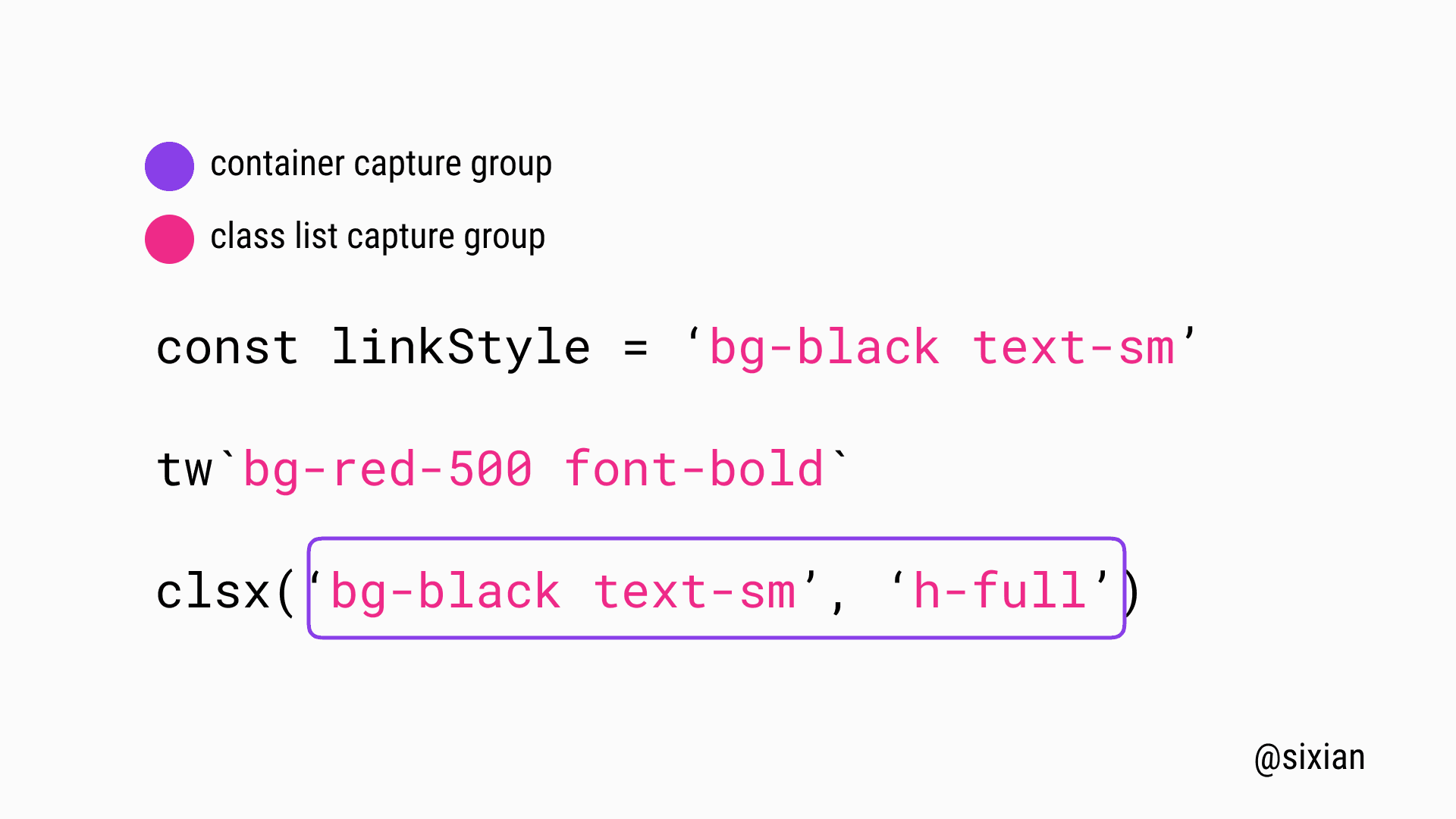As I get better at using Tailwind CSS, I can see how much it speeds up my development work. With the huge number of class names, autocomplete is particularly important. However, the official Tailwind VS Code extension has a big limitation: the IntelliSense only appears in certain places.
For example, it works well inside the classname attribute of a JSX element, but when you want to extract some styles into a string variable or an object for reusability, you lose the autocomplete.
not working
Add custom classRegex
To fix this, we can customize an experimental setting called tailwindCSS.experimental.classRegex. It lets you specify a list of regular expressions which trigger autocompletion when matched.
Open your settings.json, and the syntax is as follows:
"tailwindCSS.experimental.classRegex": [
"<container with only one classlist>",
["<container regex>", "<class list regex>"]
]"tailwindCSS.experimental.classRegex": [
"<container with only one classlist>",
["<container regex>", "<class list regex>"]
]The regex can either be a string or an array, depending on whether you’re matching one or more class lists. Let’s define the terms:
- A classlist is a string containing Tailwind classes. For example,
'bg-black h-full text-sm'is one class list. - A container contains one or more class lists.
// container with only one class list
tw`bg-black text-sm`
// same, one class list
const a = 'bg-black text-sm'
// container with multiple class list
clsx('bg-black text-sm', 'h-full')// container with only one class list
tw`bg-black text-sm`
// same, one class list
const a = 'bg-black text-sm'
// container with multiple class list
clsx('bg-black text-sm', 'h-full')Each regex must contain exactly one capture group, and that’s where the autocomplete pops up.

Example1: Variable assignments
Say we want to have autocomplete in variable assignments for variables ending with “Style”, we use [^'] to capture anything inside the single quotes that’s not a single quote.
{
"tailwindCSS.experimental.classRegex": [
// const linkStyle = 'bg-black text-sm'
"Style = '([^']*)'"
]
}{
"tailwindCSS.experimental.classRegex": [
// const linkStyle = 'bg-black text-sm'
"Style = '([^']*)'"
]
}To make it more flexible, we can ignore whitespaces and handle double quotes and backticks.
inline object
{
"tailwindCSS.experimental.classRegex": [
// const aStyle = 'text-slate'
// const bStyle = `text-zinc-300`
// const cStyle = "text-red-400"
"Style\\s*=\\s*['\"`]([^'\"`]*)['\"`]"
]
}{
"tailwindCSS.experimental.classRegex": [
// const aStyle = 'text-slate'
// const bStyle = `text-zinc-300`
// const cStyle = "text-red-400"
"Style\\s*=\\s*['\"`]([^'\"`]*)['\"`]"
]
}Example2: Object
We have multiple class lists inside an object, so we need the array syntax instead of a single string. The first regex matches anything inside {}, and the second one matches any string in the values.
{
"tailwindCSS.experimental.classRegex": [
// const styles = { a: '<class lists>', b: '<class lists>'}
["{(.*)}", ": '([^']*)'"]
]
}{
"tailwindCSS.experimental.classRegex": [
// const styles = { a: '<class lists>', b: '<class lists>'}
["{(.*)}", ": '([^']*)'"]
]
}To handle multiline objects, we can use [\s\S] to match everything including newlines. And we use the regex above to handle whitespaces and other quotes.
{
"tailwindCSS.experimental.classRegex": [
// object
// const styles = {
// a: 'bg-black text-ellipsis',
// b: 'text-sm',
// }
["{([\\s\\S]*)}", ":\\s*['\"`]([^'\"`]*)['\"`]"]
]
}{
"tailwindCSS.experimental.classRegex": [
// object
// const styles = {
// a: 'bg-black text-ellipsis',
// b: 'text-sm',
// }
["{([\\s\\S]*)}", ":\\s*['\"`]([^'\"`]*)['\"`]"]
]
}Now we have a fully working Tailwind autocomplete for objects!
multiline object
Bonus
A useful trick I learned from this tweet is to turn on editor.quickSuggestions on strings, so we can trigger suggestions while typing in the string instead of relying on whitespace as the trigger.
"editor.quickSuggestions": {
"strings": "on"
}"editor.quickSuggestions": {
"strings": "on"
}string on
string off